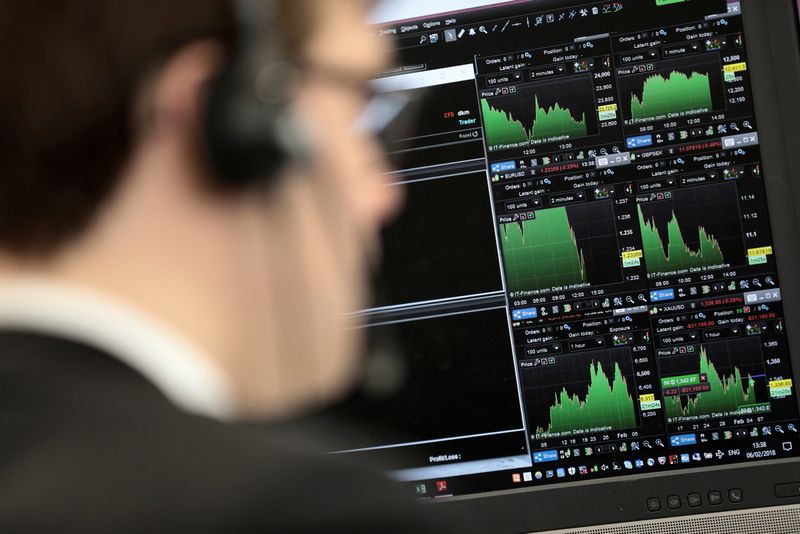Investing.com -- Wall Street looks set to end a difficult week on a bright note, although the release of the Federal Reserve's favorite inflation gauge later in the session could influence sentiment. Apple is losing market share in the important Chinese market, while European corporate earnings continue to flow.
1. Key PCE inflation data due
The spotlight Friday will be on the Federal Reserve’s preferred gauge of inflation, which could test market expectations that the U.S. central bank is all but certain to cut interest rates in September.
June's personal consumption expenditures (PCE) price index is expected to have climbed 0.1% on the month, with the annualized figure at 2.5%, very close to the Fed’s 2% target.
Additionally, “Friday’s June core PCE inflation report is expected to show a 0.2% m/m increase in prices last month, leaving the year-ago increase unchanged at 2.6%,” JPMorgan economists said in a note.
The consumer price index fell in June for the first time in four years, cementing market expectations that the Fed is primed to cut interest rates, although next week’s meeting is likely too soon.
2. Futures edge higher; weekly losses likely
U.S. stock futures edged higher Friday ahead of a key inflation reading, but Wall Street remained on course for hefty losses this week, led lower by the tech sector.
By 04:00 ET (08:00 GMT), the Dow futures contract was 210 points, or 0.5%, higher, S&P 500 futures climbed 35 points, or 0.7%, and Nasdaq 100 futures rose by 170 points, or 0.9%.
The S&P 500 and tech-heavy Nasdaq Composite closed lower Thursday, while the blue-chip Dow Jones Industrial Average bucked the trend, adding 0.2%.
However, all three indices are set to post a losing week, with the S&P 500 down 1.9% so far, the Nasdaq losing nearly 3.1%, and the DJIA down roughly 0.9%.
All eyes will be on the release of June’s personal consumption expenditures report, the Fed’s favorite inflation reading, as investors look for more clues pointing to a September rate cut.
There will be more earnings to digest Friday, from the likes of Bristol Myers (NYSE:BMY), 3M Company (NYSE:MMM) and Colgate-Palmolive (NYSE:CL).
3. Apple suffers drop in Chinese sales
Apple (NASDAQ:AAPL) is facing intensifying competition in China, its third-largest market, resulting in the iPhone maker dropping out of the top five in a list of smartphone vendors.
Apple’s smartphone shipments in China fell by 6.7% in the second quarter of 2024, according to data from market research firm Canalys, with total shipments of 9.7 million units, down from 10.4 million units in the same quarter last year.
Apple’s shipments have been declining since the first quarter when they dropped 25% year on year to 10 million units.
Chinese consumers are increasingly turning to local suppliers for their smartphones, as these Chinese brands aggressively incorporate generative AI into their products.
The Canalys data revealed that Apple's market share decreased to 14% from 16% in the same quarter of 2023, with its ranking in the Chinese smartphone market falling from third to sixth place.
Vivo was the top vendor with a share of 19%, followed by Oppo, Honor and Huawei with 16%, 15% and 15% respectively.
4. Mercedes-Benz (OTC:MBGAF) disappoints in Europe
The quarterly earnings season is also continuing in Europe, with investors digesting results from a number of important companies.
Mercedes Benz (ETR:MBGn) stock fell after the German luxury automaker narrowed its annual forecast for the profit margin in its core car division, adding to the weakness in the sector in the region after Stellantis (NYSE:STLA) reported on Thursday a sharp fall in net profit for the first half of 2024.
Capgemini (EPA:CAPP) stock slumped 9% after the French IT consulting group forecast a surprise fall in annual revenue, citing persistent weakness in its North American market.
EssilorLuxottica (EPA:ESLX) stock rose 7% after the eyewear maker reported a strong financial performance for the first half of 2024, underpinned by solid revenue growth and margin expansion.
Hermes (EPA:HRMS) stock gained 3% after the luxury goods company reported a hefty rise in second-quarter sales, demonstrating the continued appetite for its expensive handbags.
5. Crude on course for negative week
Crude prices stabilized Friday, but were on track for a third straight week of decline, largely due to weak demand in China, the world's largest crude importer.
By 04:00 ET, the U.S. crude futures (WTI) traded largely flat at $78.28 a barrel, while the Brent contract rose 0.1% to $82.39 a barrel.
The Brent contract was trading marginally lower this week, while WTI was down over 2%, and the benchmarks have fallen about 5% in the last 3 weeks.
Concerns over waning demand in China have weighed heavily, with data this week showing the Asian giant's apparent oil demand fell 8.1% to 13.66 million barrels per day in June.
Gross domestic product data, released last week, showed the Chinese economy grew less than expected in the second quarter, and Beijing has unexpectedly cut a swathe of lending rates this week, suggesting growing concerns over sluggish growth in the country.
